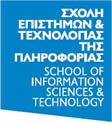Ερευνητικό Σεμινάριο της Σχολής 12/12/2019
Το Ερευνητικό Σεμινάριο της Σχολής Επιστημών και Τεχνολογίας της Πληροφορίας περιλαμβάνει ομιλίες διακεκριμένων ομιλητών σε θέματα ενδιαφέροντος για αμφότερα τα Τμήματα της Σχολής. Η δεύτερη ομιλία θα διεξαχθεί την Πέμπτη 12 Δεκεμβρίου 2019, και ώρα 13:15 έως 14:30, στην αίθουσα 103 του κτηρίου της οδού Τροίας, από τον Καθηγητή Milan Vojnovic (Professor of Data Science, London School of Economics).
Ο τίτλος και η περίληψη της ομιλίας αυτής, καθώς και σύντομο βιογραφικό του ομιλητή έχουν ως εξής.
====================================
Learning to Match in Online Platforms
Milan Vojnovic (LSE)
Abstract:
A fundamental problem arises in online platforms that requires to match users and tasks so that work is performed efficiently. For example, in collaborative online Q&A platforms, experts need to be matched to questions posed by other users, and in popular freelancing online platforms, independent professionals need to be matched to jobs posted by various businesses. This is a challenging problem because of uncertainty (about user skills and task requirements) and online decision making (users and/or tasks arrive over time and have to be matched upon their arrival). We will first present our results on the efficiency of strategies for matching users and tasks that not only use the prior information about the task but also the information observed while matching a task to users until its successful completion. We will show how the concepts originally developed in the area of queueing networks, can be combined with learning to devise efficient matching policies. In particular, we will show throughput-optimality of a backpressure policy that accounts for the competition between different task types.
We will then present some of our results on the efficiency of matching policies that use only some summary statistics (we refer to as test scores) to represent skills of individuals, and use these test scores to match individuals to projects. On the positive side, we will show how test scores can be designed to guarantee efficiency of matches for various team production functions. On the negative side, we will show that some simple, intuitive tests scores can fail to provide efficient matches. Joint work with Lennart Gulikers, Laurent Massoulie, and Virag Shah (first part) and Shreyas Sekar and Seyoung Yun (second part).
Short biography:
Milan Vojnovic is a Professor of Data Science, with the Department of Statistics at London School of Economics and Political Science (LSE) and the founding director of the MSc in Data Science programme. Prior to this, he was a Senior Researcher at Microsoft Research, Cambridge, United Kingdom, where he worked from 2004 to 2016. He received a Ph.D. degree in Technical Sciences from Ecole Polytechnique Federale de Lausanne (EPFL), Switzerland, in 2003, and both M.Sc. and B.Sc. degrees in Electrical Engineering from the University of Split, Croatia, in 1995 and 1998, respectively.
He undertook an internship with Mathematical Research Center, Bell Laboratories, Murray Hill, New Jersey, in 2001. From 2005 to 2014, he was a visiting professor with the University of Split, Croatia. From 2014 to 2016, he was an affiliated lecturer with the Statistical Laboratory, University of Cambridge.
His research interests are in data science, machine learning, networks, and multi-agent systems, with applications in the broad area of information systems and networks. He has made contributions in the area of scalable algorithms for data processing and performance evaluation of computer systems and networks, in particular, in the areas of incentives and online services, distributed computing, network resource allocation, transport control protocols, and peer-to-peer networks.
He was awarded the 2010 ACM Sigmetrics Rising Star Researcher award, and the 2005 ERCIM Cor Baayen Award. He received the IEEE IWQoS 2007 Best Student Paper Award (with Shao Liu and Dinan Gunawardena), the IEEE Infocom 2005 Best Paper Award (with Jean-Yves Le Boudec), the ACM Sigmetrics 2005 Best Paper Award (with Laurent Massoulie), and the ITC 2001 Best Student Paper Award (with Jean-Yves Le Boudec).
He delivered numerous lectures and seminars in both academia and industry. He taught several editions of a computer networking course to the undergraduate computer science program at the University of Split. He taught two editions of a course on contest theory within Part III of Mathematical Tripos (master program in mathematics) at the University of Cambridge. He authored the book ``Contest Theory: Incentive Mechanisms and Ranking Methods,'' Cambridge University Press, 2016.
====================================




 Patision 76
Patision 76 30 2108203 911
30 2108203 911
